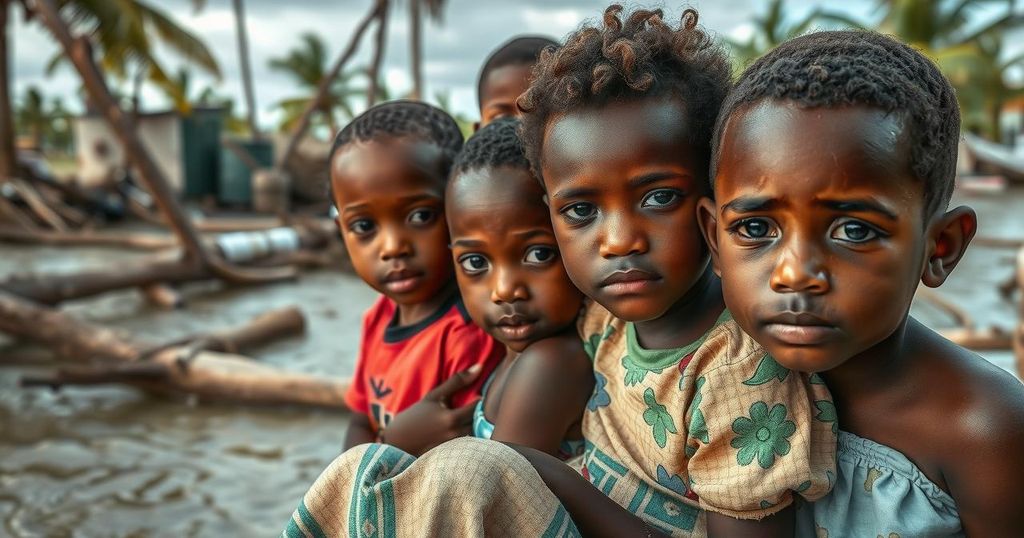Cyclone Chido Causes Severe Impact on Children and Communities in Mozambique

Tropical Cyclone Chido severely impacted northern Mozambique, affecting over 90,000 children and destroying numerous homes and classrooms. More than 174,000 people overall have been impacted, with humanitarian agencies responding amid ongoing assessments to identify and meet urgent needs. The cyclone exacerbates existing crises in a region facing prolonged conflicts and health emergencies.
In Mozambique, Tropical Cyclone Chido struck the northern region over the weekend, resulting in significant devastation to communities in Cabo Delgado province. Current assessments report that the storm has destroyed or damaged over 35,000 homes and impacted approximately 90,000 children, according to the UN Children’s Fund (UNICEF). The storm has affected more than 174,000 individuals, with ongoing evaluations expected to increase this figure as the situation develops.
Notably, the cyclone caused the destruction of at least 186,000 classrooms and impacted 20 health facilities. The storm made landfall near Pemba city, where it wreaked havoc by blowing away roofs and damaging crucial infrastructure. Mary Louise Eagleton, UNICEF Representative in Mozambique, emphasized that the nation is one of the most affected globally by climate change, with children already facing numerous life-threatening crises, including conflict, drought, and disease outbreaks.
Cabo Delgado has endured prolonged conflict over the past seven years, forcing over 1.3 million individuals—predominantly women and children—into internal displacement. The aftermath of Cyclone Chido has exacerbated existing hardships, as many survivors have seen their recently rehabilitated homes washed away. The cyclone also significantly affected neighboring provinces, such as Nampula and Niassa, where over 25,000 families were left without electricity, and essential water facilities were damaged.
The World Health Organization (WHO) is actively conducting health assessments to address immediate needs in the impacted areas. In the first two days post-cyclone, the UN Refugee Agency (UNHCR) provided essential emergency relief to over 2,600 people in Pemba, distributing blankets, sleeping mats, mosquito nets, and supplies for emergency shelter. UNHCR spokesperson Eujin Byun noted that preliminary evaluations indicate approximately 190,000 individuals urgently require humanitarian assistance, with extensive damage including 33 affected schools and nearly 10,000 destroyed homes.
Following the cyclone, UN Secretary-General António Guterres expressed that UN teams are delivering emergency assistance and are prepared to provide additional support as required. However, limited supplies are complicating the response, prompting Emergency Relief Coordinator Tom Fletcher to allocate $4 million to Mozambique for initial humanitarian efforts. As nearly 3.3 million people are projected to face high levels of food insecurity next year, the World Food Programme (WFP) plans to enhance support for those hardest hit by the cyclone.
The article covers the recent impact of Tropical Cyclone Chido in Mozambique, which has significantly affected communities, particularly children. The cyclone has resulted in widespread destruction, particularly in Cabo Delgado province, compounding the challenges faced by a population already grappling with pre-existing crises such as conflict and disease. This event has raised urgent concerns regarding immediate humanitarian needs and ongoing recovery efforts by UN agencies and local partners.
In conclusion, the devastation wrought by Tropical Cyclone Chido in Mozambique has impacted tens of thousands, particularly vulnerable children. As assessments continue to reveal the extent of damage, agencies like UNICEF and WHO are mobilizing resources and support to address urgent humanitarian needs. The situation remains critical, emphasizing the necessity for continued international assistance as communities work to recover from this disaster.
Original Source: news.un.org






